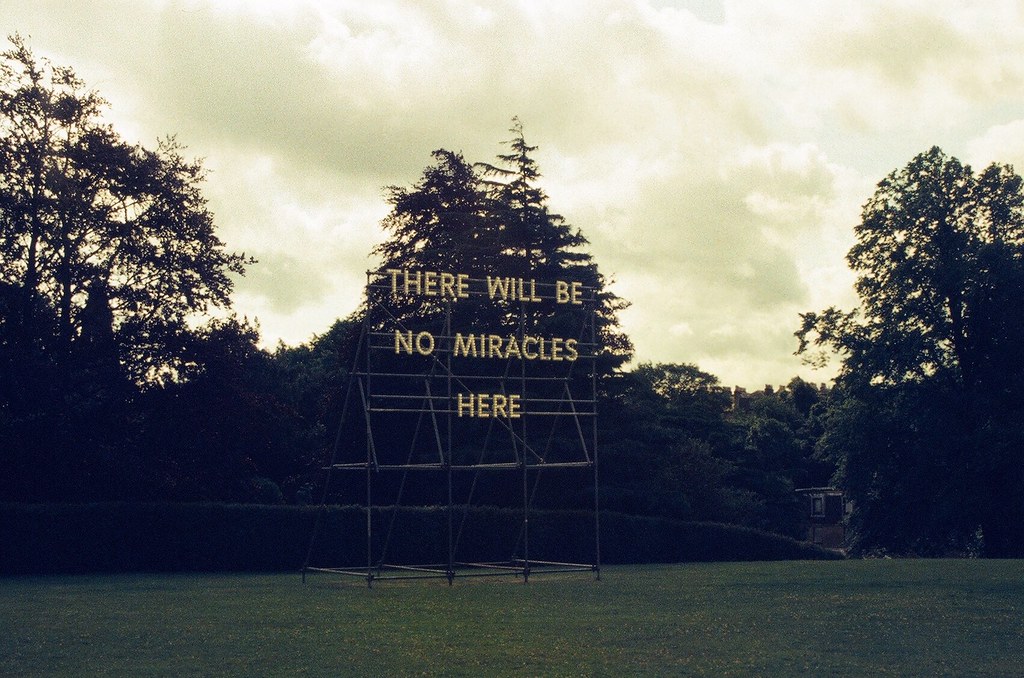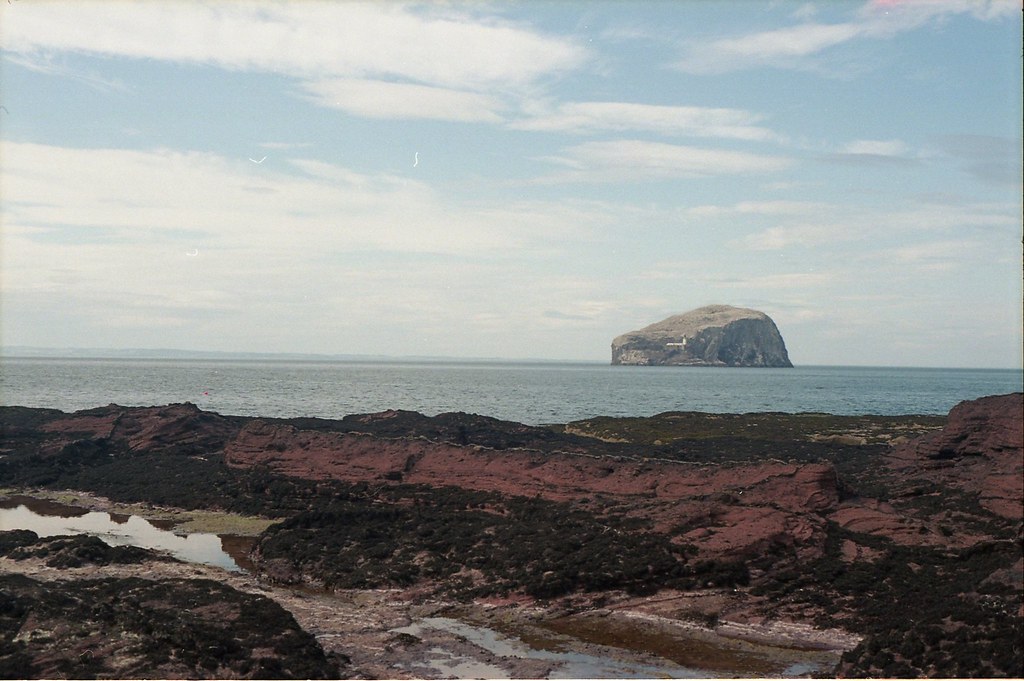.

Untitled (Scotland): photo by Dorota Marta (Sex Crime 1984), 7 August 2013
My apologies to chance for calling it necessity.
My apologies to necessity if I'm mistaken, after all.
Please, don't be angry, happiness, that I take you as my due.
May my dead be patient with the way my memories fade.
My apologies to time for all the world I overlook each second.
My apologies to past loves for thinking that the latest is the first.
Forgive me, distant wars, for bringing flowers home.
Forgive me, open wounds, for pricking my finger.
I apologize for my record of minuets to those who cry from the depths.
I apologize to those who wait in railway stations for being asleep today at five a.m.
Pardon me, hounded hope, for laughing from time to time.
Pardon me, deserts, that I don't rush to you bearing a spoonful of water.
And you, falcon, unchanging year after year, always in the same cage,
your gaze always fixed on the same point in space,
forgive me, even if it turns out you were stuffed.
My apologies to the felled tree for the table's four legs.
My apologies to great questions for small answers.
Truth, please don't pay me much attention.
Dignity, please be magnanimous.
Bear with me, O mystery of existence, as I pluck the occasional thread from your train.
Soul, don't take offense that I've only got you now and then.
My apologies to everything that I can't be everywhere at once.
My apologies to everyone that I can't be each woman and each man.
I know I won't be justified as long as I live,
since I myself stand in my own way.
Don't bear me ill will, speech, that I borrow weighty words,
then labor heavily so that they may seem light.

Untitled (North Berwick, Scotland): photo by Dorota Marta (Sex Crime 1984), 7 August 2013

Dorota (Scotland): photo by Dorota Marta (Sex Crime 1984), 7 August 2013
Her 1996 Nobel citation called attention to the elegance of Szymborska's language, dubbing her "the Mozart of Poetry", and credited her with possessing "the fury of Beethoven".
ReplyDeleteWild hyperbole in the case of any other poet, in Szymborska's case hardly more than fair praise, considering the quality of the work.
Her explanation quoted toward the end of this short obit, as to why, over six decades of writing more or less steadily, she had published relatively few of her poems, ought to be inscribed on the forehead of every conscientious MFA instructor.
(Pardon the oxymoron.)
And O by the by, to allay any recurring outbreaks of skepticism brought on by irritable reaching after fact and reason -- Marta and Dorota Are Real!
Nay more than real... style icons yet, our brilliant pair!
There may be miracles here.
"...forgive me, even if it turns out you were stuffed".
ReplyDeleteWit and humility together. There's a rare thing.
Thank you for this. It's remarkable and, for me at least, totally unexpected. It really raised my day and made me want to read more writing by Wislawa Szymborska. Curtis
ReplyDeleteI agree with Wooden Boy about the wit and humility combined in Szymborska's poetry. What I also love here is the combination of the quiet conversation expressed/contained in the words and the absolute quality of silence in the images, and the way the former starts to fill and informs the latter. Under One Small Star (the BTP post) is very special. Curtis
ReplyDeleteThank you, Duncan and Curtis.
ReplyDeleteI've been strongly drawn to this poet in later years, even as I've found much American poetry irrelevant if not in fact also unreadable.
Some bits snipped from an essay on Szymborska's work may be of interest:
__
Szymborska is a poet of philosophical reflection. Like most Polish poets of her generation, she avoids personal effusions and an emotional tone. Absent as a person, she is nevertheless strongly present as a voice -- a voice which is unmistakably her own and impossible to confuse with that of any other poet. It is a voice of a Cartesian consciousness and of a cognitive subject, a voice that narrates and at the same time reflects upon the meaning and implications of its own narrative. Often the very structure of Szymborska's poems reproduces the cognitive process, and the poems become a direct and unrhetorical form of "thinking aloud."
Szymborska's reflection rarely takes the form of categorical statements, and this is especially true of her later poetry. Reluctant to provide definitive answers, the poet prefers a margin of uncertainty. It is the initial premise of Descartes's formula, the "dubito" that describes best her philosophical attitude. But unlike the French philosopher, the Polish poet is unwilling to cross the threshold of uncertainty and step into the bright light of certitude: "certainty is beautiful, / but uncertainty is more beautiful still," she admits. Szymborska's reluctance is not the result of a lack of moral determination, but rather an expression of openness. It is an awareness that truth is complex and ambiguous, that reality is thick and consists of a myriad details, all of which need to be taken into account. Avoiding anything that might smack of dogmaticism or didacticism, Szymborska prefers to conclude her poems with an admission of ignorance or doubt: "I am," she says, "a question answering a question".
This philosophical option explains also her predilection for paradox, a stylistic figure that undermines accepted truths and leaves questions open.
Despite its familiarity and ordinariness, Szymborska's poetry is neither relaxing nor comforting. It is permeated by a consciousness of death, temporariness, and human vulnerability.
Bogdana Carpenter: from Wislawa Szymborska and the Importance of the Unimportant, 1997
Tom,
ReplyDeleteThanks for putting DM's photographs next to WS's "weighty words" (which do indeed "seem [so] light"
8.10
light coming into fog against invisible
top of ridge, crow calling across field
in foreground, sound of wave in channel
nothing said of the subject
is that, could happen
there, coherence everything
showed its face, only
grey white of fog reflected in channel
cormorant flapping across toward point
Thanks Steve, and yes, gray white fog every day, hardly a clue to be found, few miracles, and yet, coherence everything... when and as one can find it.
ReplyDeleteBut the finding, in the fog: this is the labor, as the poet once had it.
Thanks Tom and thank you again or some glimpses of my homeland There is a strong Polish element in the part of Scotland I'm from I believe RAF fliers who stayed after WW2 (There were Italian POW's who stayed also and made a life there Hence the ubiquitous Italian 'Chip Shop' of my youth with ice-cream parlour attached) Anyhow good to be reminded of this poem and have stirred up my personal memories of Polish Clubs and jazz and that to die for rye bread ...... as I sit in my home with the For Sale sign hanging outside wondering whither next
ReplyDeleteI'm thinking that the sign would be an appropriate one at Murrayfield Rugby Grounds when Scotland are playing England ....
ReplyDeleteWhy the Classics
by Zbigniew Herbert
1
in the fourth book of the Peloponnesian War
Thucydides tells among other things
the story of his unsuccessful expedition
among long speeches of chiefs
battles sieges plague
dense net of intrigues of diplomatic endeavours
the episode is like a pin
in a forest
the Greek colony Amphipolis
fell into the hands of Brasidos
because Thucydides was late with relief
for this he paid his native city
with lifelong exile
exiles of all times
know what price that is
2
generals of the most recent wars
if a similar affair happens to them
whine on their knees before posterity
praise their heroism and innocence
they accuse their subordinates
envious collegues
unfavourable winds
Thucydides says only
that he had seven ships
it was winter
and he sailed quickly
3
if art for its subject
will have a broken jar
a small broken soul
with a great self-pity
what will remain after us
will it be lovers' weeping
in a small dirty hotel
when wall-paper dawns
Colin,
ReplyDeleteThe local interest shall never grow old. Speaking of signs, I'd hoped someone might wonder...
That "There Will Be No Miracles Here" sign is actually an "installation" (proper pseud name) -- a 2006 art piece by Nathan Coley, selected for shortlisting in the 2007 Turner Prize competition.
There Will Be No Miracles Here, 2006, Scaffolding and Illuminated Text, 6m x 6m x 4m, Mount Stuart, Isle of Bute
Here it is, as seen in and out of doors.
Enjoyed the Coley piece very much and, speaking of pseuds, i expect to be running into some later today because we're out and about, rather than inside our four walls, which has become unusual for us. It's a sheltered existence, but no pseuds. Curtis
ReplyDeleteOur good friend Harris Schiff has drawn our attention to a particular Szymborska poem that also happens to have been made the subject of an extremely moving video. Thank you, Harris!
ReplyDeleteWislawa Szymborska: Hatred
And text:
Hatred
See how efficient it still is,
how it keeps itself in shape -
our century's hatred.
How easily it vaults the tallest obstacles.
How easily it pounces, tracks us down.
It's not like other feelings.
At once both older and younger.
It gives birth itself to the reasons
that give it life.
When it sleeps, it's never eternal rest.
And sleeplessness won't sap its strength; it feeds it.
One religion or another -
whatever gets ready, in position.
One fatherland or another -
whatever helps it get a running start.
Justice also works well at the outset
until hate gets its own momentum going.
Hatred. Hatred.
Its face twisted in grimace
of erotic ecstasy.
Oh these other feelings,
listless weaklings.
Since when does brotherhood
draw crowds?
Has compassion
ever finished first?
Does doubt ever really rouse the rabble?
Only hatred's got just what it takes.
Gifted, diligent, hard-working.
Need we mention all the songs it has composed?
All the pages it has added to our history books?
All the human carpets it has spread
over countless city squares and football fields?
Let's face it:
it knows how to make beauty.
The splendid fires' glow in midnight skies.
Magnificent bursting bombs in rosy dawns.
You can't deny the inspiring pathos of ruins
and a certain bawdy humor to be found
in the sturdy column jutting from their midst.
Hatred is a master of contrast:
between explosions and dead quiet,
red blood and white snow.
Above all it never tires
of its leitmotif - the impeccable executioner
towering over his soiled victim.
It's always ready for new challenges.
If it has to wait a while, it will.
They say it's blind. Blind?
It's got a sniper's keen sight
and gazes unflinchingly at the future
as only it can.
Wislawa Szymborska
Translated from the Polish by Stanislaw Baranczak and Clare Cavanagh
Thank you (and Harris) for adding "Hatred" and its video rendering. As you say, it is extremely moving. Curtis
ReplyDeleteYes well I always feel somewhat askew and off the point Tom Maybe the result of living alone for so long
ReplyDelete